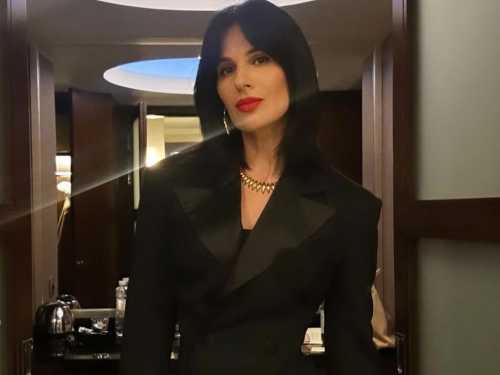“Nanette,” the Australian comedian Hannah Gadsby’s latest standup show, which runs at SoHo Playhouse through May 26th, is her last. At least, that’s what she says. Gadsby, well known in Australia for her clever, neurotic routines—which touch on everything from coming out in a virulently homophobic environment to being misgendered in public—is leaving comedy, and her intelligent, generous performance alights, in just over an hour, on many of society’s most divisive issues, first with whimsy and then with fury.
The show, set to be adapted into both a book and a Netflix special, sees Gadsby enter a stage awash in blue light. She begins in a familiar mode, establishing her personality through a series of irreverent jokes. The gay flag, she quips, is “a bit busy.” She is proud of her community but identifies primarily as “tired.” Another riff presents a deft, if recognizable, recounting of her mother’s sour reaction to her coming out. But these jokes slowly lapse into something more unnerving. The issue at the core of “Nanette” is that of story—specifically, how it’s employed and manipulated in comedy. As the show continues, Gadsby abandons the neat package of setup and punch line, and confronts her own life with a stark, intimate precision.
This isn’t to say that “Nanette” is purely confessional. Throughout her act, Gadsby weaves in a broader, more coalitional outlook, creating space, in turn, for other narratives—starting, perhaps, with those by gay women. When I saw the show, in March, the audience included a strong showing of what one might call the nearby Film Forum’s edgier crowd—that is, casually well-dressed older gays—including a handful of lesbian couples. At one point, Gadsby reflected on how, after an older act, she was struck by the “unsolicited feedback” of a lesbian disappointed by the lack of gay content in the routine. I may have imagined it, but, as Gadsby cheekily acknowledged and then corrected for that lack in “Nanette,” I felt our handful brim with a collective joy.
Gadsby would describe the paragraph I’ve just written—along with her own unveiling of a joke’s origin story—as the kind of context that’s prohibited from comedy. Usually, mining humor from queer narratives would require a measure of self-deprecation, an undermining remark about lesbian drama, fashion, or sensitivity, made from a position of power that doesn’t actually exist. These are the concessions that sustain a set: as Gadsby notes, the form relies on the surfacing of details that will keep an audience entertained, and the omission of those that would make them nervous, uncomfortable, or embarrassed. But those omissions can exact a toll, especially when catering to an audience that is primarily straight, white, and male. “I’ve made my story into a joke,” Gadsby says. “And there’s only so long I can pretend not to be serious.”
In “Nanette,” Gadsby gives her audience the benefit of an education. She explains that, for a joke to work, the comic needs to artificially create tension that she can then dispel with a punch line. For Gadsby, this tension has often sprung from her childhood on the Australian island of Tasmania, where homosexuality was outlawed until 1997, and where the community’s hatred of her sexual identity, and willingness to abuse her for it, left her deeply isolated. That description isn’t funny, of course, unless it’s set up to be. Gadsby, late in the show, critiques her own punch lines about the verbal and physical abuse she sustained, leaving the audience to sit with the revelation that pain has to be mined, manipulated, and stripped of context to make a good joke. (“I have a responsibility to make you laugh,” she concedes. “But I’m not in the mood.”)
For Gadsby, narrative context is what’s missing not only from comedy but from art and politics at large. During the second half of the show, she turns her attention to abusers such as Roman Polanski, Pablo Picasso, Bill Cosby, and Louis C.K., dismantling the public’s hand-wringing over toxic men and their precious creations. This preoccupation, as Gadsby notes when discussing Picasso’s misogyny, serves to mythologize male artists and, in the same breath, deny women—especially women of color, queer women, and trans women—respect, attention, and both literal and figurative investment. The context here is not only that these men abused women while they made their work but that they were able to go on doing so because, to society, the women they abused didn’t matter, nor did the women’s work, nor did any other woman or her work.
I’ve never heard a joke that was able to tell that story, that painted the contours of inequity while honoring the resulting tension—a tension felt more deeply by some members of the audience than by others. Gadsby manages to do so by embracing both her humility and her anger. She knows her perspective is personal, but she also takes her place in a collective fight, risking a well-cultivated, well-monetized persona to say something uncomfortable and real without a final, numbing punch. In daring to move beyond the not-so-subversive container of a joke, “Nanette”—as uproariously funny as it is profoundly furious—is what I and more than a few other well-dressed lesbians, I imagine, hope will be a new, and not the last, chapter of a brilliant career.
Sourse: newyorker.com






